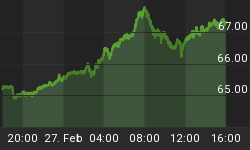The only thing more ridiculous than S&P's too little too late semi-downgrade of U.S. sovereign debt was the market's severe reaction to the announcement. Has S&P really added anything to the debate that wasn't already widely known? In any event, S&P's statement amounts to a wake up call to anyone who has somehow managed to sleepwalk through the unprecedented debt explosion of the last few years.
Given S&P's concerns that Congress will fail to address its long-term fiscal problems, on what basis can it conclude that the U.S. deserves its AAA credit rating? The highest possible rating should be reserved for fiscally responsible nations where the fiscal outlook is crystal clear. If S&P has genuine concerns that the U.S. will not deal with its out of control deficits, the AAA rating should be reduced right now.
By its own admission, S&P is unsure whether Congress will take the necessary steps to get America's fiscal house in order. Given that uncertainty, it should immediately reduce its rating on U.S. sovereign debt several notches below AAA. Then if the U.S. does get its fiscal house in order, the AAA rating could be restored. If on the other hand, the situation deteriorates, additional downgrades would be in order.
AAA is the highest rating S&P can give. It is the Wall Street equivalent to a "strong buy." If a stock analyst has serious concerns that a company may go bankrupt, would he maintain a "strong buy" on the assumption that there was still a possibility that bankruptcy could be averted? If the company declared bankruptcy, would the analyst reduce his rating from "strong buy" to "accumulate"?
In truth, if bankruptcy is even possible, the rating should be reduced to "hold,"
at best. Only if the outlook improves to the point where bankruptcy is out of the picture should a stock be upgraded to "buy." A "hold" rating would at least send the message to potential buyers that problems loom. Then if the company does declare bankruptcy, at least it does not do so sporting a "buy" rating.
Of course, by shifting to a negative outlook, S&P will try to have its cake and eat it too. In the unlikely event that Congress does act responsibly to restore fiscal prudence, its AAA would be validated. If on the other hand, out of control deficits lead to outright default or hyperinflation, it will hang its hat on the timely warning of its negative outlook. This is like a stock analyst putting a strong buy on a stock, but qualifying the rating as being speculative.
The bottom line is that the AAA rating on U.S. sovereign debt is pure politics.
S&P simply does not have the integrity to honestly rate U.S. debt. It has too cozy a relationship with the U.S. government and Wall Street to threaten the status quo.
In fact, given the culpability of the rating agencies in the financial crisis, it may well be a quid pro quo that as long as the U.S.' AAA rating is maintained, the rating agencies will continue to enjoy their government sanctioned monopolies, and that no criminal or civil charges will be filed related to inappropriately rated mortgage-backed securities.
Remember S&P had investment grade, AAA, ratings on countless mortgage-backed securities right up until the moment the paper became worthless. Amazingly, the rating agencies somehow maintained their status, and their ability to move markets, after the dust settled.
Currently, they are making the same mistake with U.S. Treasuries. Once it becomes obvious to everyone that the U.S. will either default on its debt or inflate its obligations away, S&P might downgrade treasuries to AA+. Such a move will be of little comfort to those investors left holding the bag.
In its analysis of U.S. solvency, S&P typically factors in the government's ability to print its way out of any fiscal jam. As a result, it applies a very different set of criteria in its analysis of investment risk than it would for a private company, or even a government whose currency has no reserve status. But the agency completely fails to consider how reckless printing will impact the value of the dollar itself. It can assure investors that they will be repaid, but the agency doesn't spare a thought about what if anything our creditors may be able to buy with their dollars.
Peter Schiff is CEO of Euro Pacific Capital and host of The Peter Schiff Show.
Subscribe to Euro Pacific's Weekly Digest: Receive all commentaries by PeterSchiff, Michael Pento, and John Browne delivered to your inbox every Monday.
Be sure to pick up a copy of Peter Schiff's hit economic fable, Howan Economy Grows and Why It Crashes.















